Carrots are the most common vegetables in everyone’s kitchen. They can be eaten fresh as a snack, in salads, in carrot soup, in stir-frying, in stews, in garnishes and in a variety of dishes, such as carrot medleys for winter. They are also used to make carrot juice, which is full of vitamins and beneficial nutrients. In this article, we will discuss the health benefits of carrot juice and give you some delicious recipes with it.
Benefits of carrot juice
Carrot juice made from fresh carrots is highly nutritious. They are rich in vitamins and other beneficial substances that strengthen the immune system, improve the body’s performance and provide many benefits.
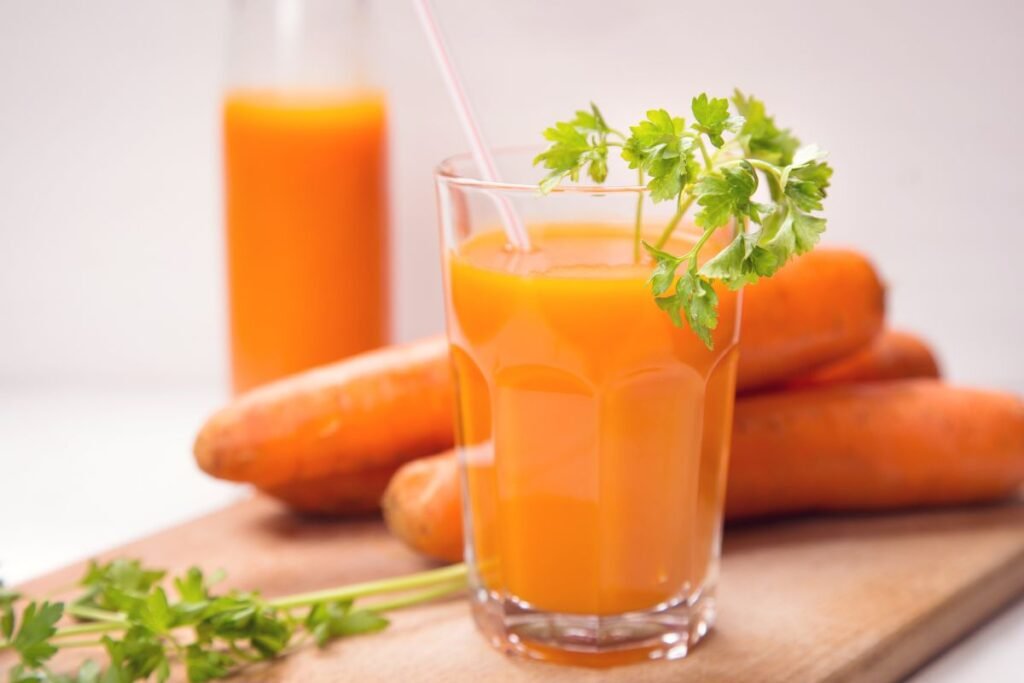
- Carrot juice is highly nutritious. Carrot juice is low in calories and carbohydrates but rich in beneficial substances. One hundred grams of carrot juice contains: 40 kcal, 1 g of protein, 0.2 g of fat, 9 g of carbohydrates, 4 g of sugars, 1 g of fibre, 956 mcg of vitamin A, 8.5 mg of vitamin C, 0.217 mg of vitamin B6, 15.5 mcg of vitamin K, 292 mg of potassium. Carrot juice also contains the carotenoid pigments lutein and zeaxanthin, which act as antioxidants in the body to fight free radicals and protect cells from damage.
- Maintains good eye health. 1 cup (236 ml) of carrot juice contains more than 250% of vitamin A. Studies show that consumption of fruits and vegetables containing provitamin A (carotene) is associated with a lower risk of blindness and age-related eye diseases. In addition, carrot juice is an excellent source of lutein and zeaxanthin, which accumulate in the eyes and protect them from blue light and UV rays.
- Strengthens the immune system. Vitamins A and C in carrot juice act as antioxidants and protect immune cells from free radical damage. It is also rich in vitamin B6, which is essential for an optimal immune response, as a deficiency of this vitamin can weaken immunity.
- Improves metabolism. The high content of B vitamins in carrot juice improves energy metabolism in the body. These vitamins are important for the activity of various enzymes involved in energy metabolism. Therefore, drinking carrot juice helps to maintain a high energy level in the body and improves digestion.
- Maintains good skin condition. The vitamin C in carrot juice is essential for the production of collagen, which gives elasticity and firmness to the skin. The carotene in the juice also protects the skin from harmful ultraviolet rays.
- Strengthens the heart. Carrot juice is rich in potassium, which is important for regulating blood pressure. Carrot juice also lowers blood cholesterol, which reduces the risk of heart disease.
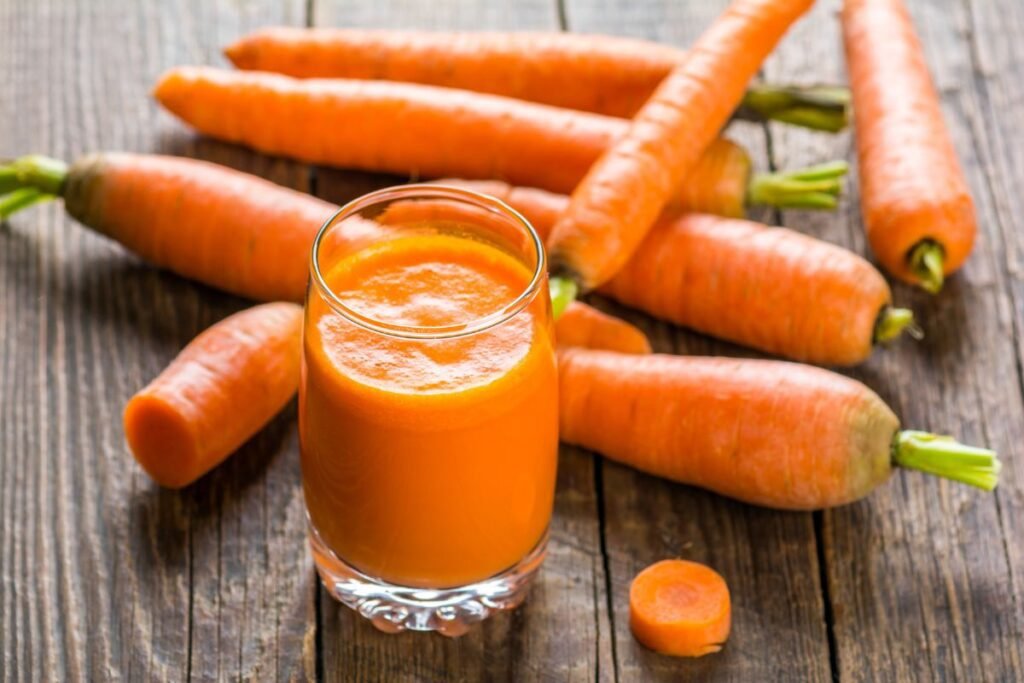
When and how much should I drink carrot juice?
To enrich your body with vitamins, it is recommended to drink 50 ml of carrot juice at least half an hour before or 1-1.5 hours after a meal. If you are eating a protein-rich or hard-to-digest meal, you should drink the juice after a longer period of 2-3 hours. It is important to remember that carrot juice should not be drunk as a refreshing drink, but as a dietary supplement in small quantities.
Risks and side effects of carrot juice
Although carrot juice is very beneficial and safe to drink, freshly squeezed juice is unpasteurised and should be avoided by some people. Because fresh juice retains bacteria, it should be avoided by pregnant women, the elderly, young children and people with compromised immune systems. In this case, they should be heated to eliminate the bacteria before consumption.
Drinking too much carrot juice can lead to carotenaemia, a condition in which the skin turns yellow-orange due to an increase in beta-carotene in the blood. Although this condition is not harmful, it can raise concerns about jaundice. Temporarily removing beta-carotene sources from the diet will usually resolve the problem.
Carrot juice contains less fibre than whole carrots and more natural sugars. Because of its lower fibre content, sugars are absorbed more quickly, so drinking too much carrot juice can lead to high blood sugar levels and should be used sparingly by diabetics.
In general, carrot juice should not be abused as it is rich in vitamin A, which in excess can lead to hypervitaminosis or liver disease.
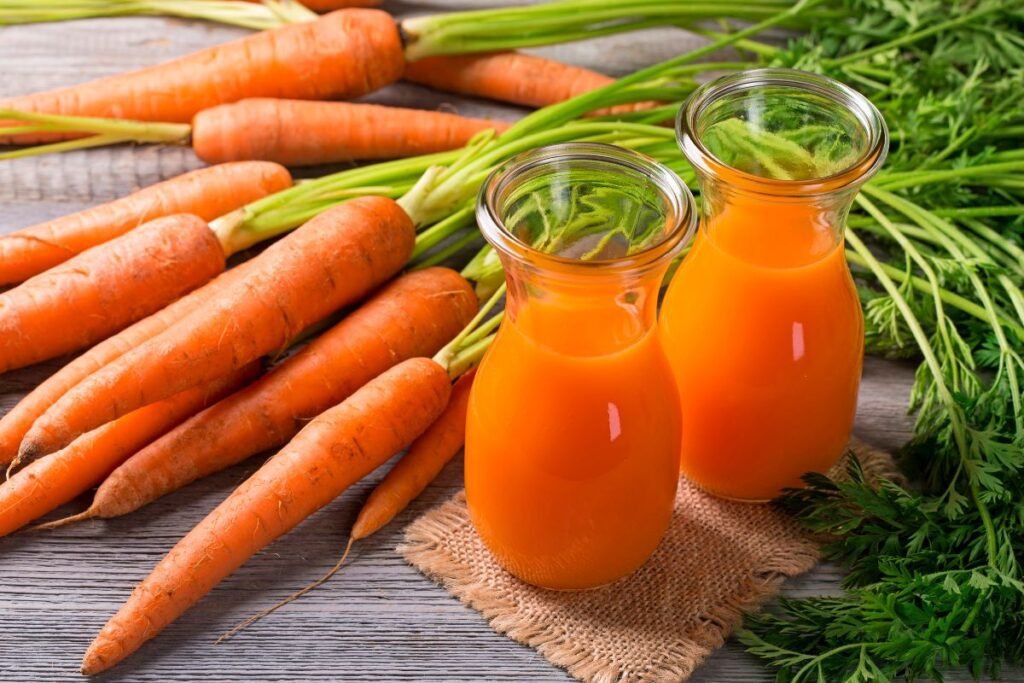
Carrot juice recipes
Carrot juice is not only a tasty drink, but also a great way to enrich your body with vitamins and minerals. It can be made from carrots alone or mixed with other fruit or vegetables. It is important to note that freshly squeezed juice should be drunk immediately, as all the vitamins it contains are lost later. There are also other dishes that can be prepared with carrot juice, recipes for which are shared below.
Apple and carrot juice
Carrot and apple juice will replenish your body with immune-boosting nutrients.
Ingredients:
- 0,5 kg carrots
- 200 g apples
Preparation: Peel the carrots and apples, remove the seeds from the apples, put everything in a juicer and squeeze the juice.
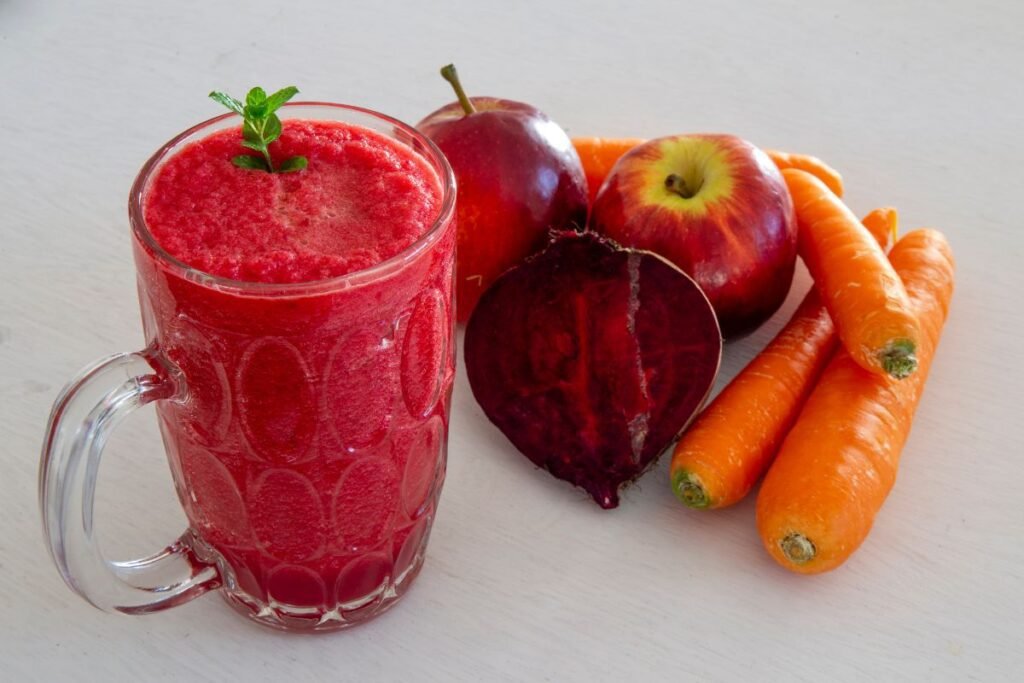
Juice the beetroot and carrots
This combination is ideal for those with low haemoglobin levels. This juice is rich in vitamins, minerals and fibre. Drinking carrot and beetroot juice every day can give you around 5-8% of your total dietary fibre, keeping your body healthy, strong and energetic.
Ingredients:
- 200 g beetroot
- 150 g carrots
- 100 g apples
Preparation: Peel the carrots, beetroot and apples, remove the seeds from the apples, put everything in a juicer and squeeze the juice.
Juice the lemons and carrots
Lemon will add vitamin C to the carrot juice already discussed, which is particularly useful for boosting immunity.
Ingredients:
- 200 g carrots
- 80 g lemons
- 80 g water
Preparation: peel and chop the carrots, put the carrots in a juicer, add water, squeeze the lemon juice and squeeze the juice.
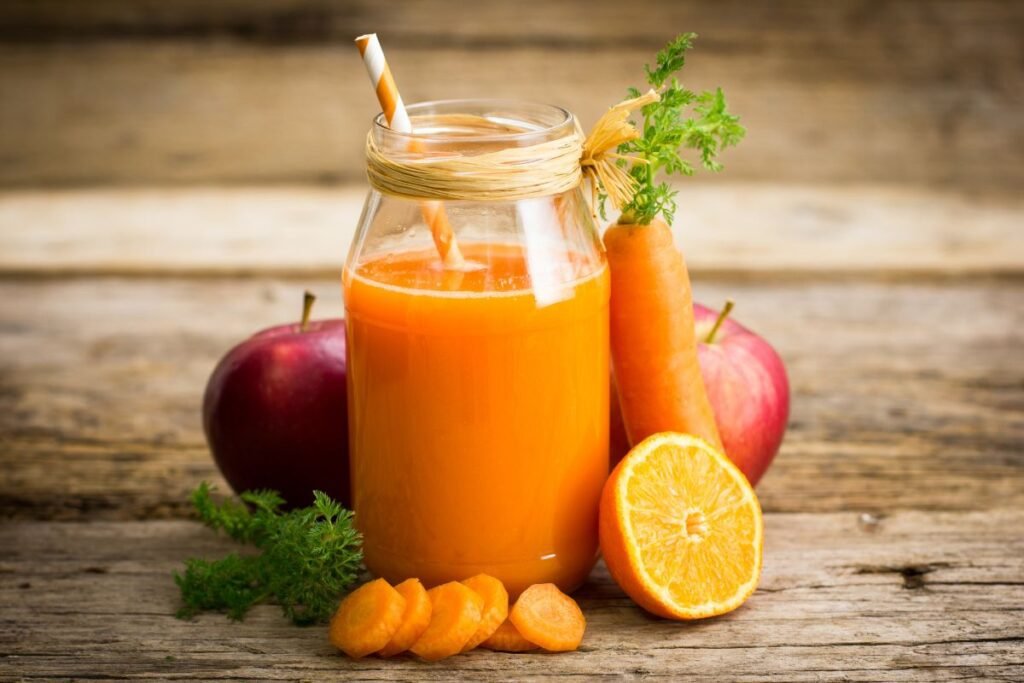
Pumpkin and carrot juice for winter
Carrot juice can also be made for longer periods of time or for winter. We’ll have them on hand as soon as we want them. This juice will enrich the body with a wealth of vitamins.
Ingredients:
- 1 l of water
- 1 kg pumpkin
- 800 g carrots
- 50 g of sugar
- 0,5 lemon
Preparation:
- Peel the pumpkin, remove the seeds and cut into small pieces. Peel the carrots and cut them into small pieces. Mix the vegetables in a saucepan, add a little water and cook over medium heat until soft.
- Once the vegetables are cooked, mash them with a masher.
- Add the water, sugar and lemon juice and cook the juice for 10-15 minutes over a medium heat.
- Pour the juice into pre-sterilised jars, close the lids tightly, invert and cover with a towel, and store until completely cool.
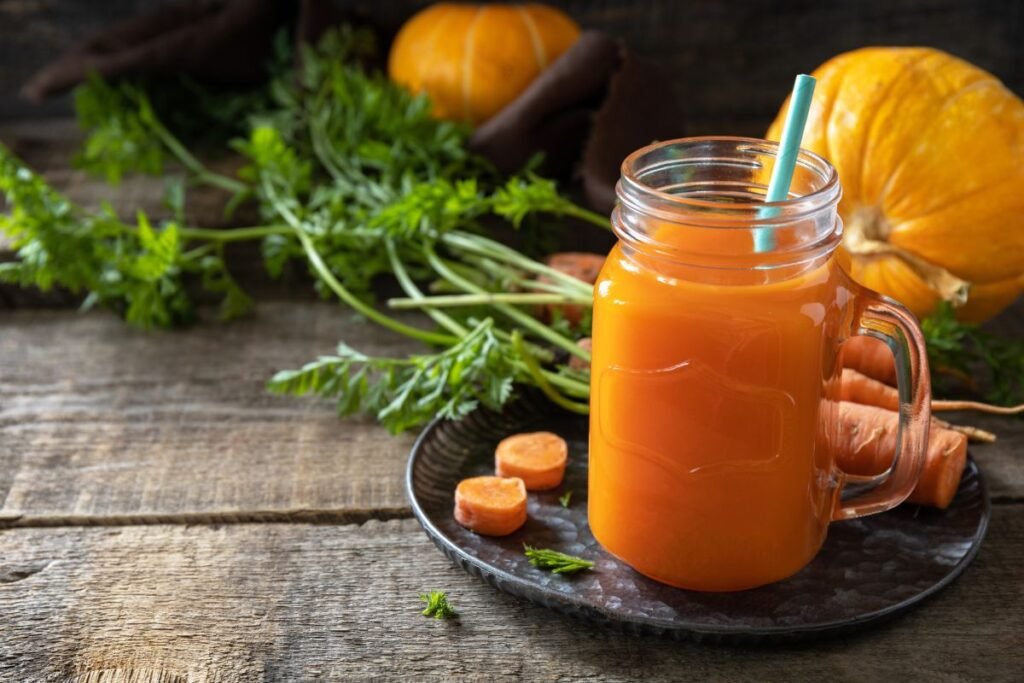
Homemade carrot caviar
An unexpected and interesting recipe for carrot caviar. It is easy to make and can be used as a garnish for sandwiches, a variety of appetizers or fish dishes.
Ingredients:
- 500 g carrot juice
- 500 g sunflower oil
- 50 g lemon juice
- 5 g agar agar (or gelatine)
- salt, to taste
Preparation:
- Put the carrot juice, lemon juice and salt in a saucepan.
- Add the agar agar to the pot and heat until boiling.
- Cool the mixture to 60 °C and pour it into the pipette.
- After the mixture has cooled slightly, drip it into cold oil at about 6 °C.
- Finally, scrape the resulting roe through a sieve and decorate the dishes.
Author Egidija Indulytė
Sources:
https://www.medicinenet.com/9_health_benefits_of_drinking_carrot_juice/article.htm
https://pharmeasy.in/blog/ayurveda-uses-benefits-side-effects-of-carrot-juice/
https://www.webmd.com/diet/health-benefits-carrot-juice
https://www.healthline.com/nutrition/carrot-juice-benefits#nutrition-facts
Associative photos © Canva.
